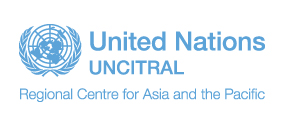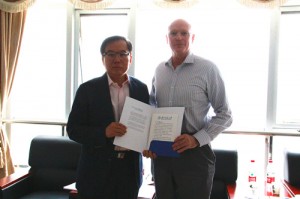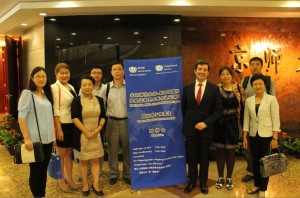
COLLABORATION FOR EXCELLENCE
UNCITRAL-BNU Joint Certificate Program
International E-Commerce Law: Theory and Practice
Mission and Purpose
E-transactions are not limited by national borders by nature. Their adequate legal treatment is critical to ensure that all the benefits associated with the use of electronic means are fully enjoyed. Electronic exchanges have recently further increased due to the mobility of devices, but this also created additional legal challenges. In order to understand the main issues and the policy and practical implications, learning international law and foreign laws involving e-commerce has become as important as study of the relevant national laws.
The United Nations Commission on International Trade Law Regional Centre for Asia and the Pacific (hereinafter referred to as UNCITRAL RCAP) and Beijing Normal University (BNU) have established a Joint Certificate Program to provide a high-level research and training forum on various legal issues in international electronic transactions, with special attention for international aspects and transnational legislation.
The partners of the Joint Certificate Program
UNCITRAL is the core legal body of the United Nations system in the field of international trade law. UNCITRAL is a legal body with universal membership specializing in commercial law reform worldwide for over 40 years. The mission of the UNCITRAL is the modernization and harmonization of the rules on international business. UNCITRAL is, inter alia, providing technical assistance in law reform projects to formulate the modern, fair, and harmonized rules on commercial transaction. The RCAP started its operations on 10 January 2012. Its mandate includes enhancing international trade and development in the Asia-Pacific region by promoting certainty in international commercial transactions through the dissemination of international trade norms and standards, in particular those elaborated by UNCITRAL.
BNU, formed 1902, is a renowned institution of higher education known for teacher education, education science and basic learning in both the arts and the sciences. BNU Law School was inaugurated on 26 April 2006, building on the pre-existing Law Department. BNU Law School and the College for Criminal Law Science (CCLS), established in August 2005, form the integral law education of Beijing Normal University. The Law School and the CCLS also have many international links and partnership programs with leading universities and legal institutions around the world.
Prospective Students
The Joint Certificate Program offers a high-quality, international and visionary legal training on the electronic transactions, particular in the cross-border environment. Each year, the Program is only open for up to 15 fellows from governments (particularly from developing countries in Asia and the Pacific), academics and private sector, in addition to a few selected post-graduate students.
Teaching Modules
The Joint Certificate Program consists of a one-year program structured on two semesters consisting of 6 modules critical to understand cross-border e-commerce, i.e.
1. Legal Issues in Cross-Border E-Transactions (跨境电子交易法律问题);
2. Legal Issues in Cross-Border Data flow (跨境数据流通的法律问题);
3. Dispute Resolution For Cross-Border E-Commerce(跨境电子商务的争议解决)
4. Internet Governance in E-Commerce (电子商务中的互联网治理问题);
5. Intellectual Property Issues in Cross-Border E-Commerce(跨境电子商务的知识产权法律问题);
6. Governmental Regulation on Cross-Border E-Commerce (跨境电子商务的监管法);
.
Faculties, Lectures and Academic Supervision
The International Expert Advisory Committee (IEAC), co-chaired by UNCITRAL and BNU, monitors teaching and academic quality of the Program.
Mr. Renaud Sorieul, UNCITRAL Secretary & Co-Chair of IEAC
Prof. Guangju Chen, BNU Vice President & Co-Chair of IEAC
The Program will be taught by the distinguished international and domestic experts in the relevant areas. The Interim Faculties for the first three modules include:
Dr. Luca Castellani, Secretary of UNCITRAL Working Group IV (Electronic Commerce) & Co-Director of Joint Certificate Program
Mr. Joao Ribeiro, Head, UNCITRAL RCAP
Prof. Guisella Finocchiaro, Professor of Internet Law and of Private Comparative Law at the University of Bologna, Italy; Chair of UNCITRAL E-Commerce Working Group
Prof. Hong Xue, BNU Professor & Institute for Internet Policy & Law Director, Member of Advisory Committee of UNNeXT, Expert Advisor of China Ministry of Commerce, Co-Director of Joint Certificate Program
Mr. Alamusi, Internet Rules Research Center Director, China E-Commerce Law Net CEO and China E-Commerce Association Policy & Law Subcommittee Deputy Director
In addition to the regular faculties appointed by the IEAC, guest lecturers from Government, business and the legal profession will provide students with the latest information and knowledge.
Administration, Application & Enrollment
Teaching will be delivered in a compressed schedule in 2 weeks in 2014-2015 Year so as to be compatible with professional engagements of students. Students may elect to take any week may or enroll in the full program. Students who complete all modules will be awarded the Program Certificate. Alternatively, students can obtain a certificate of attendance for each pertinent module.
In Autumn Semester of Year 2014-2015, the intensive course is scheduled in the week of November 23-29, 2014. All the enrolled fellows would be able to join, in addition to the course study, the “E-Commerce Expert Public Lecture Series” and “1st High-Level Forum on International E-Commerce Law” in the same week, free of charge.
Applicants should submit their CVs and personal statements to UNCITRAL-BNU JCP Steering Committee via email <jcp@bnu.edu.cn> before September 30, 2014. Once enrolled, the students may acquire BNU course credits and entitled to the other student benefit.



